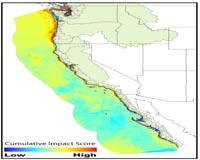| . |  |
. |
Manado, Indonesia (AFP) May 15, 2009 Leaders from six nations agreed Friday to work jointly to save Southeast Asia's massive Coral Triangle, considered the world's richest underwater wilderness. The leaders of East Timor, Indonesia, Malaysia, Papua New Guinea, the Philippines and the Solomon Islands signed off on proposals to expand maritime sanctuaries and no-fishing zones during talks in Indonesia. The Coral Triangle Initiative calls for stronger international cooperation to combat illegal fishing and environmental destruction in an area half the size of the United States and home to half the world's coral reefs. "The Coral Triangle is a globally recognised treasure. It is unique, there is nothing like it on Earth," Indonesian President Susilo Bambang Yudhoyono said of the region, which has been compared to the Amazon rainforest for its biodiversity. Scientists say a combination of climate change, overfishing and pollution is destroying ecosystems in the Triangle, which is a vital source of food for millions of people and a nursery for maritime life from turtles to tuna. Under the initiative, the littoral countries agreed to expand protected ocean reserves by millions of hectares (acres) and establish joint strategies for identifying key ecosystems and species for conservation. The initiative calls for fishing to be banned from 20 percent of each major coastal habitat in the Triangle such as coral reefs, mangrove forests and seagrass areas, but set no specific time target. It also sets targets ranging between 2012 and 2020 for the designation and establishment of "priority seascape" marine reserves and stronger legislation and planning to curb overfishing and protect threatened species. The agreement also calls for the establishment within four years of a plan to help coastal and small island ecosystems adapt to consequences of climate change such as rising sea levels, warming waters and increases in acidity. Indonesia -- a massive archipelago of 17,000 islands -- said it would set aside 20 million hectares (49.4 million acres) of maritime conservation parks by 2020, up from 13.4 million currently. The overall plan however contained no solid combined target on the protected areas. The agreement was praised by environmental groups as a rare example of high-level leaders backing an ambitious conservation plan. Conservation International head Peter Seligmann said in a statement, "in 30 years of conservation work, I have never seen anything like this; six leaders signing a commitment to protect their marine resources for the wellbeing of their citizens and future generations." A report by environmental group WWF this week said climate change could wipe out the Coral Triangle by century's end if nations do not commit to deep cuts in emissions of greenhouse gases blamed for global warming. The death of the reefs could leave more than 100 million people without livelihoods, triggering destabilising mass migrations to cities and neighbouring countries, it said. A new round of international climate change talks to replace the Kyoto Protocol will take in the Danish capital Copenhagen in December. Share This Article With Planet Earth
Related Links Water News - Science, Technology and Politics
 Scientists Map West Coast Areas Most Affected By Humans
Scientists Map West Coast Areas Most Affected By HumansSanta Barbara CA (SPX) May 13, 2009 Climate change, fishing, and commercial shipping top the list of threats to the ocean off the West Coast of the United States. "Every single spot of the ocean along the West Coast," said Ben Halpern, a marine ecologist at the National Center for Ecological Analysis and Synthesis (NCEAS) at the University of California, Santa Barbara, "is affected by 10 to 15 different human activities annu ... read more |
|
| The content herein, unless otherwise known to be public domain, are Copyright 1995-2009 - SpaceDaily. AFP and UPI Wire Stories are copyright Agence France-Presse and United Press International. ESA Portal Reports are copyright European Space Agency. All NASA sourced material is public domain. Additional copyrights may apply in whole or part to other bona fide parties. Advertising does not imply endorsement,agreement or approval of any opinions, statements or information provided by SpaceDaily on any Web page published or hosted by SpaceDaily. Privacy Statement |